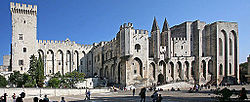A request that this article title be changed to 1352 conclave is under discussion . Please do not move this article until the discussion is closed. |
| Papal conclave December 1352 | |
|---|---|
| Dates and location | |
| 16–18 December 1352 Palais des Papes, Avignon | |
| Key officials | |
| Dean | Pierre Desprès |
| Camerlengo | Stefano Aldebrandi Cambaruti |
| Protodeacon | Gaillard de la Mothe |
| Elected pope | |
| Étienne Aubert Name taken: Innocent VI | |
 | |
The papal conclave held from 16 to 18 December 1352 was convened after the death of Pope Clement VI and elected as his successor Cardinal Etienne Aubert. The fifth pope of the period of the Avignon Papacy, he took the name Innocent VI. This conclave is remarkable because during its celebration cardinals for the first time in history subscribed the electoral capitulation, which limited the power of elect. [1]
